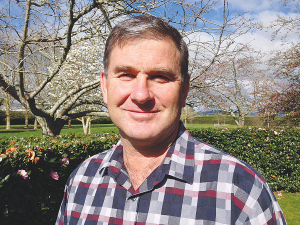Dedoncker Departs Fonterra After Mainland Group Sale
Fonterra executive René Dedoncker is leaving the co-operative later this year to lead Australian agribusiness Elders.
 Waikato dairy farmer Garry Reymer says no one has yet been able to monetise GHG reductions to the farmer.
Waikato dairy farmer Garry Reymer says no one has yet been able to monetise GHG reductions to the farmer.
A Fonterra shareholder says he doubts that consumers around the globe are clamouring for products with a low carbon footprint.
Garry Reymer, Cambridge, claims some of the co-operative's major customers are seeking to piggyback on Fonterra farmers' low carbon footprint to meet their politically driven environmental obligations.
Reymer, Waikato Federated Farmers dairy chair, says consumers of Fonterra products "just want a safe food that is high in protein at a good price".
"We should not confuse consumers with customers," he told Rural News.
Reymer's comments come as Fonterra prepares to unveil scope 3 targets - for farmers to reduce their greenhouse gas emissions behind the farm gate.
The co-op is warning that failure to tackle scope 3 emissions will lead to major customers and consumers walking away, and even embracing plant-based products.
Reymer says some of Fonterra's customers in the Northern Hemisphere and the European Union are pushing a climate change agenda.
"Most of the greenhouse gas demand is government to government or government to business or B2B, but very rarely demanded by the consumer," he says.
He says this was highlighted by a presentation at the recent Rabobank Farm2Fork conference in Sydney, where a cotton producer from South Australia went to London to canvas how much more consumers would pay for sustainably produced cotton chinos over standard products.
"The answer came back 10 pounds - certainly not enough to cover the extra cost to produce," Reymer says. "Most of our dairy exports go to the low value markets that Europe doesn't want to or need to supply."
He adds, if NZ needs to comply with European demands, we should be able to compete in their market so we can try to capture some value for our farmers.
"Everybody wants an organic or sustainabl produced product until they get to the checkout counter then they just want cheap - except for a privileged few."
Reymer says no one has yet been able to monetise GHG reductions to the farmer.
"It will only add cost."
He says farmers are waiting to hear Fonterra's plans on scope 3 emissions. "My pick is they will not be able to add value to my bottom line. The same goes for banks and other industries that service farmers," Reymer adds.
"Why you may ask has a bank not come out and said, 'if your GHG emisions are 'x' you will pay this rate of interest and if it is 'y', you pay another'.
"But now they want us to reduce emissions at our cost to meet their scope 3 targets, so that they can say to the Government that they are going fine, but the producer's margin is eroded."
Former Fonterra executive Alex Turnbull has been appointed CEO to lead all five Yili Oceania Business Division companies in New Zealand.
Fonterra executive René Dedoncker is leaving the co-operative later this year to lead Australian agribusiness Elders.
Alliance Group and the Southland Stags rugby team have joined forces in a partnership that will see the the meat co-operative's farmgate brand feature on players' team kits and replica jerseys.
Fonterra's plan to expand its organic programme to the South Island is being well received by farmers, the co-op says.
Voting has started for the renewal of DairyNZ's milksolids levy.
The most successful catchment groups in NZ are those that have 'a source to sea' approach.

OPINION: Here w go: the election date is set for November 7 and the politicians are out of the gate…
OPINION: ECan data was released a few days ago showing Canterbury farmers have made “giant strides on environmental performance”.